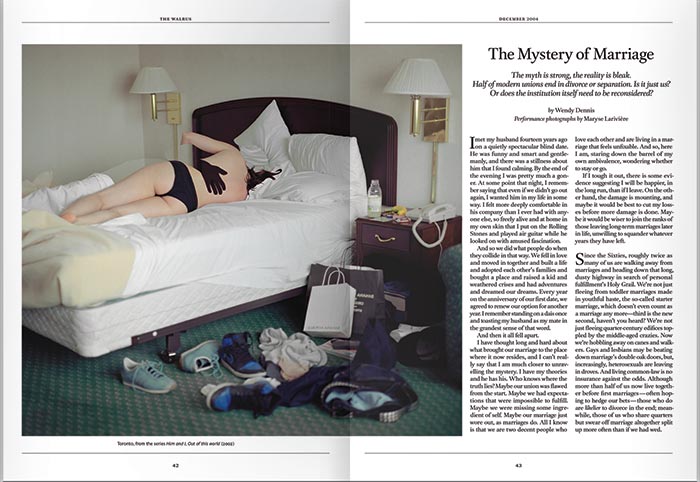
“Could it be, I wonder, that so many of us are failing at marriage because expecting to live happily with one person for the rest of our lives is an absurd idea? ” That was the central question posed by Wendy Dennis in her 2005 essay, “The Mystery of Marriage,” a lamentation of the institution’s inability to provide partnership, emotional fulfillment, and a lifetime of decent sex.
My husband and I gave our parents just two weeks’ notice before our city hall wedding a year and a half ago, but I was perhaps more surprised than they were. A decade ago, when I was in my twenties, my idea of party talk was to cite Friedrich Engels (marriage is sanctioned prostitution), or to proclaim, arrogantly, that it was arrogant for straight couples to get married when gay men and lesbians did not enjoy the same legal rights. Marriage implied an elaborate ceremony, a big white dress, a gendered division of household chores, and weirdly enmeshed lives—a templated, terrifyingly boring way to live.
But the institution was changing, even as I complained about its irrelevance. Canada legalized same-sex marriage the year Dennis wrote her essay, and now more than 21,000 lesbian and gay couples have been wedded. Today about a third of wives earn more than their partners do, and the number of stay-at-home dads has tripled since 1986. Intercultural unions like mine are more prevalent, and the average age of newlyweds has risen by about six years since the ’70s.
I’ve changed, too. There were friendships lost and found, endless new apartments, and too much time wasted on a stupid, harmful boyfriend. As the “young” qualifier on my adulthood wore off, stability began to feel like roots, not chains. And when my husband turned out to be both a babe and a revelation in honesty and trust, my feelings about marriage changed as well.
I came to understand that it was not absurd to imagine that I could live happily with another person for the rest of my life. Rather, it was absurd to imagine that I would always be happy, period. Last winter, my uncle died the day before my mother’s birthday. Instead of driving everyone to her surprise party, my husband took us to a funeral home, a cemetery, and a service. He moved furniture, served food, and hugged my mom in a fluorescent-lit mosque, after hours spent listening to words he didn’t understand. I’m not trying to be a downer; most of our life together involves planning our next cocktail or transatlantic plane trip. But one cheesy marital cliché has proved true: a good partner makes the happy times better and the sad ones easier to bear.
The oft-quoted 50 percent divorce rate is out of date: in Canada, divorces have fluctuated between 35 and 42 percent for the past two decades. My husband and I hope to stay in the majority. We were both in our mid-thirties when we got married, and marriages made later in life have a better chance of survival. There are various theories to explain this: we suffer fewer money woes, and we have already learned, separately, how to buy groceries and keep the toilet clean. For us, our maturity came with a strong sense of self. We encourage each other’s individual pursuits; difference, and time spent apart, keeps our edges sharp.
Each joyful (or cringe-worthy) ceremony moulds the meaning of marriage, as does every celebrity divorce, every hopeful second attempt, and every grandparents’ silver anniversary. While the institution represents solidity, marriage remains as fluid and elusive as love.
This appeared in the June 2013 issue.




